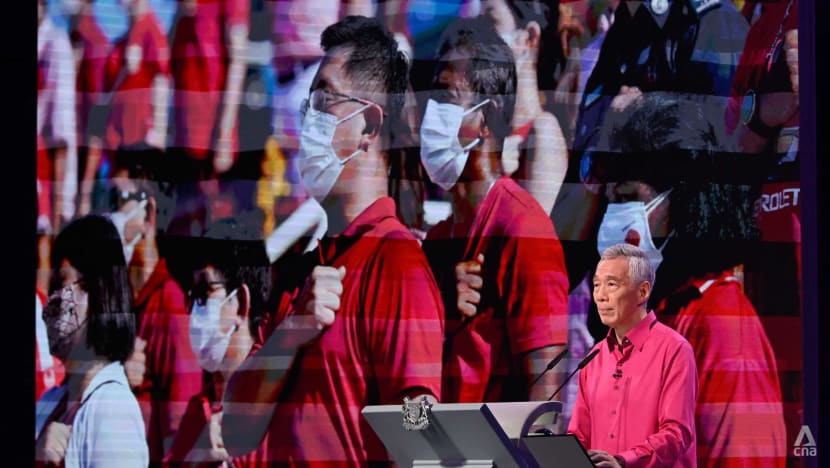NDR 2021: PM Lee says ‘entirely baseless’ to claim that ‘Chinese privilege’ exists in Singapore

Prime Minister Lee Hsien Loong speaking during National Day Rally 2021. (Photo: Try Sutrisno Foo)
SINGAPORE: It is “entirely baseless” to claim that there is “Chinese privilege” in Singapore, said Prime Minister Lee Hsien Loong on Sunday (Aug 29), noting that Singapore treats “all races equally, with no special privileges”.
But he said that racial harmony may be taken for granted following decades of peace, with some Chinese Singaporeans being unaware of how ethnic minorities feel.
Mr Lee, who was delivering his Mandarin speech at the National Day Rally, raised two areas where ethnic minorities continue to face difficulties in – renting a home and finding a job.
These issues “involve the common space that all races share and directly affect race relations”, he said, according to a provided translation in English.
Such preferences by some home owners and employers could build up to become prejudice and if left unaddressed, would gradually deepen the fissures in Singapore’s society.
“Therefore, all of us must uphold the principle of racial equality to build a more inclusive society,” the Prime Minister said.
“WE TREAT ALL RACES EQUALLY”
Mr Lee said a few race-related incidents have generated much discussion and debate over the past few months.
Such incidents have occurred sometimes in the past but did not attract as much attention, he said. Now with social media, they can be easily played up and blown out of proportion, affecting relations between races.
Fortunately, most Singaporeans understand the importance of racial harmony, said Mr Lee, noting that many people of all races have spoken up against racism and rejected racial discrimination.
Singapore’s founding leaders stood firm on the over-arching policy of racial equality in the early years of nationhood. The Pioneer and Merdeka generations, who lived through the country’s turbulent times, also greatly supported Singapore’s multiracial policies, he added.
“The Government was impartial when drafting our laws and administrative measures, and did not favour any race. This fundamental founding policy was supported by the Chinese community and became the bedrock of our multiracial harmony,” Mr Lee said.
Chinese Singaporeans “made some concessions for the greater good”, for instance by adopting English as Singapore’s lingua franca to put ethnic minorities more at ease.
“The use of English put those who spoke only Mandarin and dialects in a disadvantageous position. Therefore, it is entirely baseless to claim that there is ‘Chinese privilege’ in Singapore,” Mr Lee said.
“We treat all races equally, with no special privileges. Few countries have made this their policy, and even fewer have actually managed to make it a reality.”
What the country has seen after 56 years is “testament” that this fundamental national policy has benefited all races, including the Chinese, added the Prime Minister.
“It brought about racial harmony and social stability, which has enabled us to live peacefully. It has also helped to strengthen our relations with our neighbouring countries, and built trust,” he said.
RACIAL HARMONY STILL “A WORK IN PROGRESS”
But following decades of peace, racial harmony may have gradually been taken for granted.
Some Chinese Singaporeans may be unaware of how ethnic minorities feel, said Mr Lee, noting that this was what he heard from non-Chinese Singaporeans time to time.
He went on to raise two examples as a reminder that the country’s racial harmony “remains a work in progress” and that “racial emotions still exist” even as different communities have become closer.
The first is how some ethnic minorities have had unhappy experiences when renting a home. This happened when some Chinese home owners tell their property agents that they prefer not to have tenants of a particular race.
“Thus, when non-Chinese prospective tenants show up, the property agent tells them: ‘Sorry, you can’t rent the place as the owner doesn’t want tenants of a particular race’,” Mr Lee said in his speech.
“Not all home owners are like that but it’s not difficult for us to imagine how hurt these minority tenants feel when they have such encounters.”
The second is how ethnic minorities sometimes face more difficulties during job searches, with some employers preferring to hire Chinese employees.
While some jobs require proficiency in the Chinese language, it is not a must for some others. If employers still state Mandarin as a requirement, the minorities will find this unreasonable and unfair, said Mr Lee.
“I raise these two examples to prompt all of us to understand the concerns and difficulties faced by our ethnic minorities and be accommodating towards them.”
He noted that it is human nature to be drawn to those with similar linguistic and cultural backgrounds when seeking friends and life partners. As these are matters that concern private lives and personal decisions, they generally have no great impact on society.
But that is not the case when employing someone or renting a house, which involves “the common space that all races share and directly affect race relations”.
“If we let the preferences of such employers and home owners build up over time, they will become prejudice, and minorities will feel they are discriminated against. If left unaddressed, such preferences will gradually deepen the fissures in our society,” Mr Lee said.
“In short, I hope Singaporeans of all races can continue to work for the greater good in the spirit of mutual compromise. Only then can we achieve lasting harmony and unity as a country and society.”
THE ROLE OF SAP SCHOOLS
In his speech, Mr Lee also said that the Government will support all races in promoting and preserving their own rich cultural heritage.
The Government has always given its full support to Chinese culture, he added, noting that he was heartened by the “tireless” efforts of many Chinese organisations to promote the local Chinese culture.
He also hoped that Special Assistance Plan (SAP) schools, which were established to preserve the traditions and values of former Chinese schools, would continue to nurture more bilingual and bicultural talents for Singapore in the new era.
SAP schools “should also let their students interact more frequently with members of other races”.
“That way, they will understand the importance of safeguarding our multicultural society from young. We must continue to prioritise this,” Mr Lee said.
















